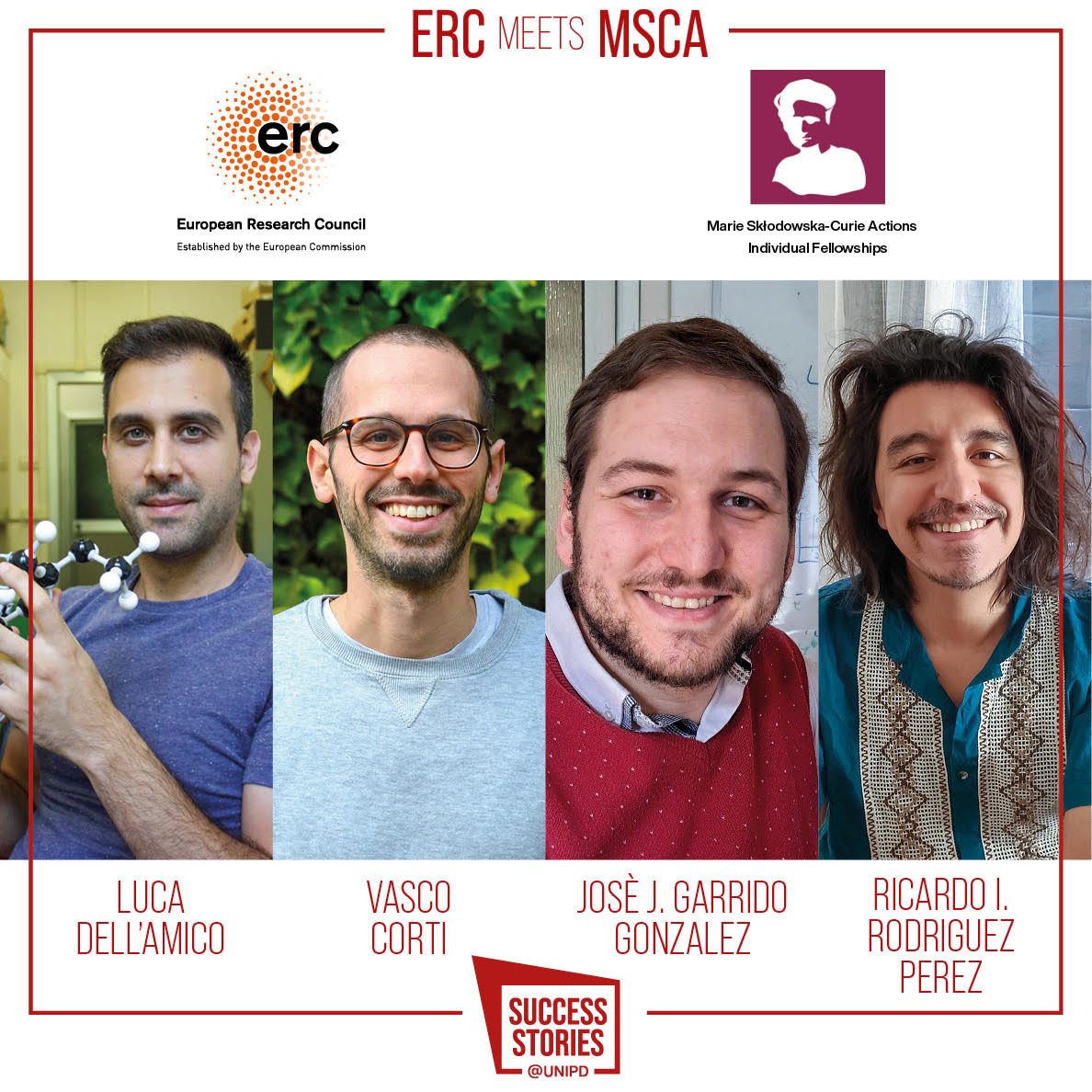
ERC meets MSCA: Luca Dell’Amico and Vasco Corti, José Javier Garrido Gonzalez, Ricardo Rodriguez Perez

“I knew he would be very present in the lab: to me this meant good project supervision and good mentoring”.
Professor Luca Dell’Amico is an ERC Grantee working at the Department of Chemical Sciences of the University of Padua. With his ERC research project he studies how solar light, the most abundant resource we have on Earth, can trigger and promote molecular chemical transformations. He has a 5-year project to work on various aspects of this process, which is called photocatàlysis, and he leads a vibrant group of young scholars in his lab. Three of them were awarded a Marie Skłodowska-Curie fellowship.
But before getting his ERC Starting Grant, Luca himself was supported by a MSCA fellowship, at the time he was a post-doc working in Tarragona, Spain.
“These two types of grant are very different” says Luca. “When I was a post-doc I learned how to tell to a general audience how important your research is. In a Marie Curie fellowship this is really key”. But when it comes to the ERC, “there’s only science, you can go deep into details”, because you will be evaluated for such scientific details.
Nonetheless, they are both very important for different phases of a researcher’s career. “I had a great time in Tarragona, both scientifically and with the group, but the ERC changed my life. I really started doing the chemistry I wanted to do, hiring people, buying instrumentation”.
After spending two years as a post-doc in Aarhus, Denmark, Vasco Corti decided to come back to Italy. “I had a very interesting idea in mind and I really wanted to develop it. So I wondered: what is the best group for me in which to develop this idea? I already knew Luca and I knew his background in light-driven methodologies could be very successful in developing this idea”. Luca was enthusiastic when Vasco reached out with a Marie Curie proposal in mind. “Talking to him was reassuring, I knew that he was an emerging scientist in this field, I knew his group was going to grow and, being Luca himself a young researcher, I knew he would probably be very present in the lab: to me this meant good project supervision and good mentoring”.
José Javier Garrido Gonzalez, instead, got to know Luca from his webpage: “I think it is very important to have an updated webpage of one’s research group and Luca’s was amazing. We met in a Zoom call and he encouraged me to apply for a MSCA fellowship. When I got the result [Editor’s note: through a standard notification e-mail] I was moving between apartments and I couldn’t even remember the password [Editor’s note: to access the European portal and verify the evaluation outcome], it was really stressful, but once I logged in and then received a message from Luca, confirming our success, I immediately told my wife.”
Things went rather differently for Ricardo Rodriguez Perez. “The announcement of the results came out on February 14th, St. Valentine’s day. I was expecting to have a very nice day at the same time. When I woke up very early in the morning I found out I didn’t get it, I was in the reserve list, even though my score was very good”. Back then Ricardo was working with Luca on the ERC funding. A few months later, last June, Luca called Ricardo from a conference in Switzerland: “I was very focused on what I was doing in the lab and Luca told me ‘it’s better you sit down: you got the Marie Curie’. It took me four hours to actually realize it, but it was a very nice surprise. I offered a round of spritz to everyone who at the lab. It was a very nice day I will not forget”.
According to Ricardo, the great thing about a MSCA fellowship for an early career researcher is learning how to spend resources and how to manage infrastructures. “I think this is the first step to a real scientist life, in terms of how to manage funds and time. I expect to learn a lot from Luca and the other fellows on how to make this experience the most fruitful, both for me personally and in terms of scientific results and communication”.
Watch the video to learn more.


